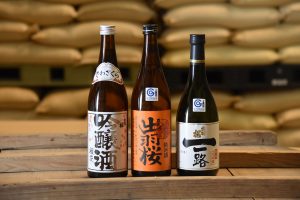
This is the first time a product from Japan has filed for a tag at the Geographical Indication Registry in Chennai. The Embassy of Japan, New Delhi, has filed an application seeking a Geographical Indication (GI) tag for Nihonshu/Japanese sake, an alcoholic beverage. It is learnt that this is the first time a product from Japan has filed for a tag at the Geographical Indication Registry here.
Bank Maha Pack includes Live Batches, Test Series, Video Lectures & eBooks
According to details provided in the filing, in Japan:
- Nihonshu is regarded as a special and valuable beverage made from fermenting rice. People traditionally drink nihonshu on special occasions, such as festivals, weddings or funerals, but it is also consumed on a daily basis. Thus, it is an integral part of the lifestyle and culture in Japan.
- The sake market (almost all are nihonshu) is the second largest brewed liquor (such as beer) market in Japan. For making nihonshu three main raw materials – rice, koji-kin (a type of fungal spore) and water – are required.
- The production of nihonshu follows an alcoholic fermentation method called parallel multiple fermentation and involves raw material treatment, koji making, starter culture making, mash making, pressing, heat sterilisation and bottling. The rice and koji used should originate in Japan.
Other points:
- The Embassy of Japan, in the filing, also mentioned that in the past, the economy of Japan was based around rice, which was used as a sort of quasi-money before the establishment of a monetary economy in the Meiji period (1869- 1912).
- As a result, nihonshu production was thoroughly under the government’s control. As nihonshu’s production became more industrialised in the Edo period (1603-1868), those who had special licences began hiring many farmers in the agricultural off-season.
- They gradually won a reputation as craftsmen, which resulted in the establishment of the hierarchical Toii system ( Toii is the person responsible for sake brewing), likened to an apprenticeship or guild system. The Toii has full authority for the production of nihonshu at breweries and leads all the workers.
- In addition, the Toii plays an important role in training young apprentices by imparting upon them their techniques and experience. Through this system, the techniques of making nihonshu are being passed on to the present day. A GI is a label that is applied to products that have a specific geographical origin and have characteristics that are
related to that particular location.
Find More Miscellaneous News Here




 Which District is known as the Medical C...
Which District is known as the Medical C...
 Which was the First Women's University i...
Which was the First Women's University i...
 L&T Vyoma to Study 250 MW Green AI D...
L&T Vyoma to Study 250 MW Green AI D...








